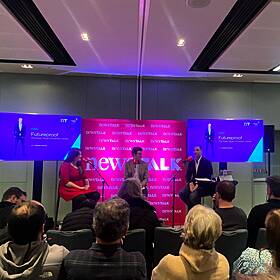
Science Week Special: What are the biggest threats to humanity?
19 November 2023 - 57 minsWhen it comes to the end of humanity, there are numerous ways it might come to pass - be it a wayward asteroid, the eruption of a super volcano, the ever-growing presence of Artificial Intelligence in our lives, or the unseen spores of a killer fungus.
But which one of these poses the greatest risk? This is the question posed by Jonathan in this very special episode of Futureproof which was recorded in front of a live audience at the Dublin Royal Convention Centre.
Joining us to discuss is:
Dr. Robert Ross, Senior Lecturer in the School of Computer Science at TU Dublin
Professor Chris Bean, Senior Professor and Head of Geophysics at the Dublin Institute for Advanced Studies
Professor C...



























